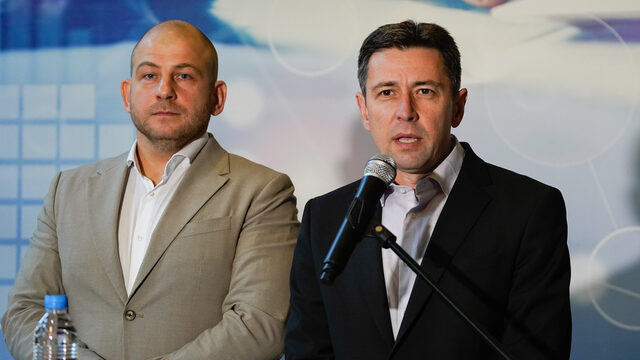On 27 October, less than 48 hours before the start of the local elections, the Central Elections Committee (CIK) changed one of the fundamental rules of the vote by unprecedentedly removing the option of machine voting. Although the elections still took place as if nothing much had happened, this action by the electoral administration served as a grim reminder of who continues to pull the strings.
Despite all the efforts of WCC-DB politicians to prove that they hold the reins over Boyko Borissov's GERB and Delyan Peevski's MRF, the last-minute removal of the machines showed the extent to which the leaders of the status quo can still influence unreformed institutions like CIK, the National Security Agency (DANS) and even the Supreme Administrative Court in order to get what they want.
Furthermore, the event showed that the stability of the "Euro-Atlantic" coalition hangs by a thread, and that thread is not the willingness of WCC-DB to tolerate their "non-coalition" partners, but vice versa. GERB and MRF could topple the government at a moment's notice and the reformists can do nothing about it.
The story of an "election hack"
In order to better explain the furore over machine voting, we need to build a timeline of what exactly happened over the last weekend.
The whole story began when Toshko Yordanov, the leader of TISP - now a minor opposition party - sounded the alarm on Friday afternoon that the WCC-appointed deputy minister of Electronic Governance Mihail Stoynov had taken pictures of the voting machines code. He claimed that this could be used to alter the results they produce. His claim was based on an alleged report by DANS distributed among parliamentary party groups and the executive a few hours earlier. Other party leaders, including Boyko Borissov and Delyan Peevski, joined in and started claiming that the elections would be "hacked," "stolen" and fiddled. Kostadin Kostadinov of Vazrazhdane even claimed WCC-DB are attempting a coup d'état.
A few hours later, CIK convened and, without much debate, in a meeting that lasted under five minutes, voted 12:2 to ban machine voting at Sunday's election. However, they did not cite the DANS report or any of the concerns shared by MPs. Instead, they said that the Ministry of Electronic Governance had failed to certify the voting machines on time. The problem with this, however, was that the Ministry still had a day to certify the devices at the time of CIK's decision.
Obviously, WCC-DB - which were the principal object of the attack, as they have consistently been the main proponents of machine voting, and because everyone else in Parliament blamed the debacle on them - protested the CIK decision and took it to court. On Saturday, the Supreme Administrative Court (SAC) decided that it would rule on the case after the first round of the elections, practically rubber-stamping the decision of CIK to not allow machines in the first round of the vote. On Monday, SAC released its mind-bending final decision, which both ignored the legal issues of CIK's Friday decision to ban machines, and simultaneously said that they can be used in next Sunday's run-offs.

Some important details
Several salient details enable us to understand why all this so personifies the captured state model in Bulgaria.
First, it is crucial to note why it was so important (especially for the status quo powers) to ban machine voting in the first round of municipal elections.
Until the recent introduction of machine voting, Bulgarian elections, and especially local elections, had been marred by dangerously high levels of disqualified ballots. In 2015 and 2019, 450-660,000 votes were not counted because the ballots were not filled in properly. This meant that 15-20% of the cast ballots were never counted and in smaller towns and villages the percentage could rise to 40%. Also, it is often left at the discretion of local voting commissions to decide whether to count a potentially spoiled ballot or not. One could imagine the potential effects this could have on the distribution of power in municipal councils - regardless of the (potentially malevolent) intent of the voting commissions in place.
Secondly, let's look at the role of DANS in the whole debacle. The "report" on alleged voter fraud turned out to be a half-page enquiry written up by the deputy head of the agency for no apparent reason. It alleged that Mr Stoynov took photos of the "code," but did not mention any procedural actions having been taken against him - questioning him or informing the Prosecution about potentially illegal actions. This is precisely because Mr Stoynov did nothing illegal, and even if he did - he could not "change the code" of the machines single-handedly, as the process depends on the approval of several other institutions, including the final approval of CIK.
This brings us to the role of the election commission itself. It is supposed to be an expert independent organ that ensures the proper organization and legitimacy of the election. Well, none of the actions of CIK in the last few days prove this was its true goal - it knew that Mr Stoynov couldn't rig the machines by himself, but still decided to ban their use. Knowing it can't do so on the basis of the absurd DANS report, CIK fabricated the alternative certification explanation. And the court had to uphold this decision for the simple reason that, if it did not, the entire local election could have been contested. A good explanation of why CIK acted like this can be found in its membership, which does not represent the current distribution of power in parliament, as the institution's seats were last distributed in 2021, when TISP was first in power and WCC-DB did not exist. So the "independent" CIK actually acted like a party puppet.
A mechanism of a captured state
The effect of all this is that the legitimacy of the crucial first round of elections is once again contestable - the rules were changed last-minute, which will sow doubts in voters, and there were up to 20% spoiled ballots (in comparison to under 3% spoiled ballots in the last national election). Above all, conspiracy theories about the "hacking" of the voting machines undermined trust in the most progressive tool against voting fraud that Bulgaria had ever adopted.
Unfortunately, this was brought about by a toxic combination of gross incompetence and malevolence on behalf of almost all institutions and individuals involved. From DANS' strange and unprofessional report, to the reaction of most politicians, which chose to undermine public trust in order to harm WCC-DB, to the partisan reaction of CIK and the actions of the court to bury the issue so as to not cause further trouble.
This is only possible because all of these institutions are still in hock to centers of power that are hard to trace and have little to do with formal institutions, rules and regulations. The levers are still controlled by the party leaders, who are happy to abuse them - and undermine the legitimacy of the whole system - for their own gain.
So do not get surprised when GERB and MRF suddenly decide to withdraw their support from PM Nikolay Denkov and the predominantly WCC-DB cabinet over something perceived as trivial. They just proved they can pull the rug under their feet during an important election and not face any consequence.
On 27 October, less than 48 hours before the start of the local elections, the Central Elections Committee (CIK) changed one of the fundamental rules of the vote by unprecedentedly removing the option of machine voting. Although the elections still took place as if nothing much had happened, this action by the electoral administration served as a grim reminder of who continues to pull the strings.
Despite all the efforts of WCC-DB politicians to prove that they hold the reins over Boyko Borissov's GERB and Delyan Peevski's MRF, the last-minute removal of the machines showed the extent to which the leaders of the status quo can still influence unreformed institutions like CIK, the National Security Agency (DANS) and even the Supreme Administrative Court in order to get what they want.












